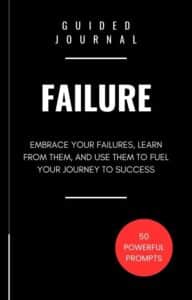What if I told you that within your failures, there lies a trove of wisdom waiting to be discovered? The idea may seem counterintuitive, even absurd to some. After all, society has conditioned us to view failure as an event to be avoided at all costs, a symbol of inadequacy and defeat. However, this perspective, as widespread as it is, might be fundamentally flawed. Welcome to “50 Journaling Prompts to Unravel the Hidden Lessons in Failure”—an exploration into the unconventional wisdom that failure offers, and a guide to harness it for personal growth and transformation.
Failure, contrary to popular belief, is not the end, but rather a beginning – a launching pad propelling us towards the path less tread, rich with invaluable insights and lessons learned. It’s a paradoxical truth that every stumble, every fall, is an opportunity to rise stronger, wiser, and more resilient. But to truly unlock the transformative power of failure, one must first learn to decipher its encrypted messages, to unravel the hidden lessons veiled behind its daunting facade. And that’s precisely where this article comes in.
From the ashes of failure, like a phoenix, can rise profound wisdom and understanding. With 50 journaling prompts, this article serves as your roadmap to navigate the intricate labyrinth of failure, helping you to unearth the nuggets of wisdom buried within. The journey will not be easy; it requires courage and vulnerability to confront your failures head-on. But rest assured, the rewards are worth the struggle. So, buckle up, open your mind and heart, and let’s embark on this enlightening journey together.
Embracing the Echoes of Failure: A Philosophical Exploration
Understanding Failure
Hello there, courageous reader! Today, we’re about to embark on a journey into a territory often feared, yet inherently essential to our human experience – the realm of failure. Ah, the dreaded ‘F’ word that sends shivers down the spine. But what is failure, really? Is it merely the opposite of success or does it hold a deeper, more profound meaning?
In its simplest definition, failure refers to the inability to achieve a goal, fulfill an expectation, or complete a task. It’s that sinking feeling when you’ve strived for something, only to fall short. You may recognize it as the missed promotion at work, the collapsed business venture, the unsuccessful diet, or even the burnt cake you attempted to bake.
The Philosophy of Failure
From a philosophical perspective, failure is not simply the absence of success. It’s a rich, multi-faceted phenomenon that offers valuable insights into our strengths, weaknesses, and the very essence of our being. This perspective challenges the conventional view of failure as a negative outcome to be avoided. Instead, it champions the notion of failure as a catalyst for growth, innovation, and self-discovery.
Relatable Examples: Failure in Everyday Life
Let’s look at some familiar scenarios. Remember that time when you were learning to ride a bike? The countless tumbles you took before you could finally balance yourself on two wheels? That’s failure. Or think back to the first time you tried to cook a meal, and ended up creating a culinary disaster? That, too, is failure. But what did these failures result in? They led to the mastery of a new skill, the acquisition of knowledge, and the development of resilience.
The Silver Lining: Lessons from Failure
Failure, dear reader, is a gently whispered lesson from the universe, nudging us towards growth. It’s an opportunity to step back, reassess our approach, and devise a better plan. It’s a lesson in humility, a reminder that we’re human and fallible. It’s a testament to our courage, for every attempt, every risk taken, every failure experienced means we dared to step outside our comfort zone.
Embracing Failure
So, let’s shift our perspective and look at failure not as a dead-end, but as a stepping stone. Let’s embrace the failures we’ve had, for they’re proof that we’ve tried, we’ve struggled, we’ve learned. Let’s celebrate failure not because we enjoy the disappointment it brings, but because we value the wisdom it imparts. After all, without failure, there would be no growth, no innovation, no progress.
Remember this, brave reader: In life’s grand tapestry, failure is not the opposite of success. It’s a part of it.

Unveiling Journaling: Your Personal Guide to Transformation
You might be wondering, “What is journaling, and how can it possibly transform my failures?” You’ve come to the right place. This comprehensive exploration will not only define journaling but will also illustrate its transformative power concerning failure.
The Essence of Journaling
Journaling is the practice of recording thoughts, emotions, experiences, and reflections on a consistent basis. It’s like having a conversation with yourself, a dialogue with your inner being. By putting pen to paper, you are essentially creating a tangible record of your life journey, your triumphs, and, most importantly, your failures.
The Miraculous Transformation of Failure
Now let’s talk about failure. It’s a term that our society often views negatively, right? But what if I told you that journaling could help you transform your perspective on failure and turn it into a powerful tool for personal growth? Intriguing, isn’t it?
Journaling: A New Lens for Viewing Failure
Failure, as you may perceive it, is an end point, a blockade, a sign that something didn’t go as planned. But through the lens of journaling, failure can be seen as a stepping stone, not a stumbling block. It’s a chance for you to learn, grow and build resilience. Journaling gives you a space to dissect your failure, to understand what went wrong, and how it can be righted.
Embrace your Failures: The Journaling Way
When you journal about your failures, you are not dwelling on them, but rather studying them. You dissect each failure, uncover the lessons it holds, and then use these lessons as stepping stones toward success. By recording these experiences in your journal, you’re creating a detailed map of your personal journey, complete with pitfalls, detours, and all.
The Power of Reflective Journaling
Reflective journaling is a practice that encourages you to look past the surface of your failure. You do not just record the event, but you delve into the emotions you felt, the thoughts that crossed your mind, and the lessons you learned. This deep reflection allows you to gain a better understanding of yourself, your reactions, and your decision-making process, which can be incredibly transformative.
In conclusion, journaling is not just about recording thoughts or experiences; it’s a powerful tool that can help you understand and transform your failures into stepping stones to success. It’s about understanding that failure isn’t the opposite of success, but a part of it. So grab a pen, open a new page in your journal, and start writing your journey of transformation today!

Journal Writing Prompts about Failure
Write about a time you experienced failure. How did it affect you then, and how does it affect you now?
How has failure shaped your definition of success?
Describe a failure that you learned the most from. What lessons did it teach you?
Write a letter to your past self about a failure you wish you could have avoided. What advice would you give?
How has a failure in your life opened doors to new opportunities?
Reflect on a failure that led you to a path you didn’t anticipate.
Write about a time when you were afraid to fail. How did that fear affect your actions?
Discuss a failure that still haunts you. How can you come to terms with it?
How has a particular failure contributed to your personal growth?
Write about a failure that tested your resilience. How did you bounce back?
Reflect on a time when failure discouraged you. What did it take to find motivation again?
Describe a failure that challenged your beliefs or values. How did it change your perspective?
How has failure affected your relationships with others?
Write about a failure that you haven’t forgiven yourself for. How can you start the process of forgiveness?
Explore a failure that affected your self-esteem. How have you been working on rebuilding it?
Discuss a failure that made you question your abilities. How did you regain confidence?
Write about a time when you felt like a failure. How did you cope with those feelings?
How has a failure helped you understand yourself better?
Reflect on a failure that you initially regretted but now appreciate. Why is that?
Write a dialogue with failure as if it were a person. What would you tell it?
Discuss a failure that forced you to step out of your comfort zone.
Write about a failure that was out of your control. How did you handle it?
How has failure influenced your decision-making process?
Reflect on a failure that you’re thankful for. Why are you grateful for it?
Write about a failure that has changed your life.
Discuss a failure that led you to redefine your goals.
Write about a time when you embraced failure. What changed in your approach?
How has a failure made you stronger?
Reflect on a failure that taught you more about empathy.
Write about a failure that you turned into a victory.
Discuss how failure has shaped your character.
Write about a failure that has made you more patient.
How has a failure highlighted your strengths?
Reflect on a failure that turned out to be a blessing in disguise.
Write about how you overcame the fear of failure.
Discuss a failure that has made you more courageous.
Write about a failure that has made you humble.
Reflect on a failure that has made you more compassionate.
Write about a failure that pushed you to reinvent yourself.
Discuss a failure that has made you more determined.
Write about a failure that made you rethink your priorities.
How has a failure helped you become more disciplined?
Reflect on a failure that has made you more creative.
Write about a failure that has made you more adaptable.
Discuss a failure that has taught you the importance of perseverance.
Write about a failure that has made you appreciate the journey rather than the destination.
Reflect on a failure that has made you more open-minded.
Write about a failure that has taught you the power of positive thinking.
Discuss a failure that has made you more appreciative of your accomplishments.
Reflect on what you would do differently if you knew you couldn’t fail.
Download Printable Journal Prompts (PDF) >>
Guided Journal for Failure
50 Writing Prompts to Embrace Your Failures, Learn from Them, and Use Them to Fuel Your Journey to Success

Living with Fear of Failure
Are you familiar with that sinking feeling of failure? That overwhelming fear that keeps you from taking risks, from stepping out of your comfort zone, and from pursuing your dreams? You’re not alone. Many of us are conditioned to view failure as a negative event, an end rather than a beginning. This fear of failure can hinder personal growth, creativity, and success. It creates an invisible barrier that prevents you from reaching your full potential.
The Paralyzing Impact of Fear
The fear of failure doesn’t just deter us from taking on new challenges; it can completely paralyze us, making us feel stuck in our current situations. It can breed self-doubt, lower self-esteem, and even lead to depression and anxiety. It’s a vicious cycle – the more we fear failure, the less likely we are to try, and the less we try, the more likely we are to remain stuck in the same place. It’s a constant battle between wanting to grow and being too scared to take that first step.
The Power of the “Guided Journal for Failure”
But what if we told you that failure doesn’t have to be your enemy? Enter the “Guided Journal for Failure”. This revolutionary journal is designed to help you reframe your perception of failure and use it as a stepping stone towards success. It’s more than just a journal; it’s a personal mentor guiding you through a transformative journey.
This guided journal leverages the power of introspection and self-awareness to help you understand the root cause of your fear. It provides thought-provoking prompts that encourage you to delve deeper into your experiences with failure, helping you understand its role in your life and how it shapes your decisions and actions.
Key Benefits – Embrace Failure, Achieve Success
The “Guided Journal for Failure” isn’t about avoiding failure; it’s about embracing it. Here are some of the ways this unique journal can transform your approach to failure:
1. Reframe Your Perception: The journal helps you shift your perspective on failure, teaching you to see it not as an enemy, but as a valuable learning opportunity.
2. Boost Self-confidence: By understanding and accepting your failures, you can overcome self-doubt and build a stronger, more resilient self-image.
3. Promote Personal Growth: The journal prompts you to reflect on your past failures and learn from them, fostering personal growth and development.
4. Inspire Action: By embracing failure, you can shed the fear that holds you back and take decisive action towards your goals.
Turn Your Failures into Stepping Stones
Don’t let fear of failure hold you hostage. Embrace your failures, learn from them, and use them to fuel your journey to success. With the “Guided Journal for Failure“, transform your failures into stepping stones and discover the path to your true potential. It’s time to redefine failure and reclaim your power. Order your copy today!
As we near the end of this transformative journey, it is crucial to remember that the process of unearthing lessons from failure is not a quick-fix solution, but rather a lifelong commitment to learning and growth. It is a practice that requires patience, resilience, and above all, a willingness to embrace failure, not as an adversary to be feared, but as a mentor to be revered.
The 50 journaling prompts provided in this article are your stepping stones towards a deeper understanding of yourself and the world around you. They are designed to guide you in reflecting on your past failures, not with a sense of regret or shame, but with an attitude of curiosity and open-mindedness. Each prompt is an invitation for introspection, urging you to delve deeper into the recesses of your experiences, and extract the pearls of wisdom that lie within.
In conclusion, the purpose of this article is not to eradicate the fear of failure, but rather to reshape our perspective towards it. To view each failure as an opportunity for self-improvement, a catalyst for personal growth and a stepping stone towards success. But the final question remains – are you ready to confront your failures, to unearth the wisdom they hold, and ultimately, to transform them into stepping stones towards your success? The pen is in your hand, the paper is before you, the choice is yours. Are you ready to redefine failure?

